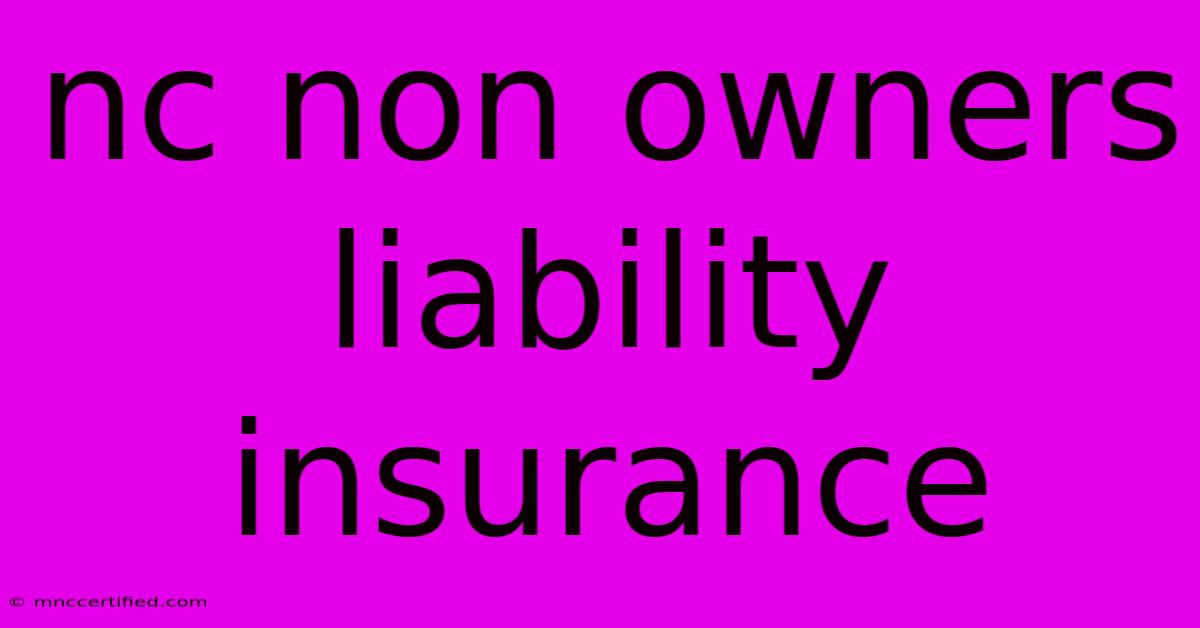Nc Non Owners Liability Insurance

Table of Contents
NC Non-Owner Car Insurance: Protecting Yourself on the Road
Are you a North Carolina resident who doesn't own a car but still needs liability coverage? Perhaps you borrow vehicles frequently, rent cars often, or rely on ride-sharing services. If so, understanding NC non-owner car insurance is crucial for your financial protection. This comprehensive guide will explain what it is, why you need it, and how to find the best policy for your needs.
What is Non-Owner Car Insurance in North Carolina?
Non-owner car insurance in NC, also known as non-owner liability insurance, provides liability coverage only when you're driving a vehicle you don't own. It protects you from financial responsibility if you cause an accident while operating someone else's car, a rental car, or even a borrowed vehicle. Crucially, it does not cover damage to the vehicle you're driving – that's the responsibility of the vehicle's owner's insurance.
This type of insurance covers bodily injury and property damage to other people involved in an accident you cause. It's a safety net, shielding you from potentially devastating legal and medical expenses. Think of it as liability protection specifically tailored for drivers without their own vehicles.
Key Differences from Standard Car Insurance
Unlike standard car insurance, non-owner policies do not include coverage for:
- Collision: Damage to the vehicle you're driving.
- Comprehensive: Damage to the vehicle from events like theft, vandalism, or weather.
- Uninsured/Underinsured Motorist: Protection against drivers without adequate insurance. (While some policies might offer this as an add-on, it's not standard.)
Therefore, if you're borrowing a car regularly, you're still reliant on the owner's insurance policy for collision and comprehensive coverage on their vehicle.
Why Do I Need Non-Owner Car Insurance in NC?
Several scenarios highlight the importance of this type of coverage in North Carolina:
- Frequent Borrower: If you regularly borrow friends' or family members' vehicles.
- Rental Car User: For those who frequently rent cars for travel or business.
- Ride-Sharing: While ride-sharing services often have their own insurance, gaps in coverage can exist, making non-owner insurance a valuable supplement.
- Driving a Company Car: If you drive a company car but your employer doesn't provide comprehensive insurance.
Without non-owner liability insurance, you could face significant financial repercussions if you cause an accident while driving a borrowed or rented vehicle. This could include lawsuits, medical bills, and repair costs – expenses far exceeding your financial capacity.
Finding the Right NC Non-Owner Car Insurance Policy
When shopping for non-owner car insurance in North Carolina, consider these factors:
- Coverage Limits: Choose limits that adequately protect you from potential liabilities. Higher limits offer greater protection but may come with higher premiums. Consult with an insurance professional to determine the appropriate level of coverage based on your individual circumstances.
- Premiums: Compare quotes from multiple insurers to find the most competitive rates. Your driving record, age, and location will significantly influence the cost.
- Reputation of the Insurer: Choose a reputable insurance company with a strong track record of customer service and claims handling.
- Additional Coverage Options: While uncommon, some insurers may offer optional add-ons like uninsured/underinsured motorist coverage. Inquire about these possibilities.
Is Non-Owner Car Insurance Mandatory in North Carolina?
While not mandatory in North Carolina, non-owner car insurance is highly recommended for anyone who drives vehicles they don't own. The potential financial risk of driving without it significantly outweighs the cost of the policy.
Disclaimer: This information is for general guidance only and does not constitute legal or insurance advice. Consult with a qualified insurance professional for personalized advice and to obtain accurate and up-to-date information regarding your specific needs and the requirements of North Carolina law. Always refer to your insurance policy for specific details of your coverage.

Thank you for visiting our website wich cover about Nc Non Owners Liability Insurance. We hope the information provided has been useful to you. Feel free to contact us if you have any questions or need further assistance. See you next time and dont miss to bookmark.
Featured Posts
-
Rare Photo Knox Jolie Pitt Spotted
Nov 19, 2024
-
High Risk Life Insurance Carriers
Nov 19, 2024
-
Ukraine New Data On Nk Forces In Russia
Nov 19, 2024
-
Croatia Vs Portugal Highlights 2024 25
Nov 19, 2024
-
Australia Wins Third T20 Against Pakistan
Nov 19, 2024